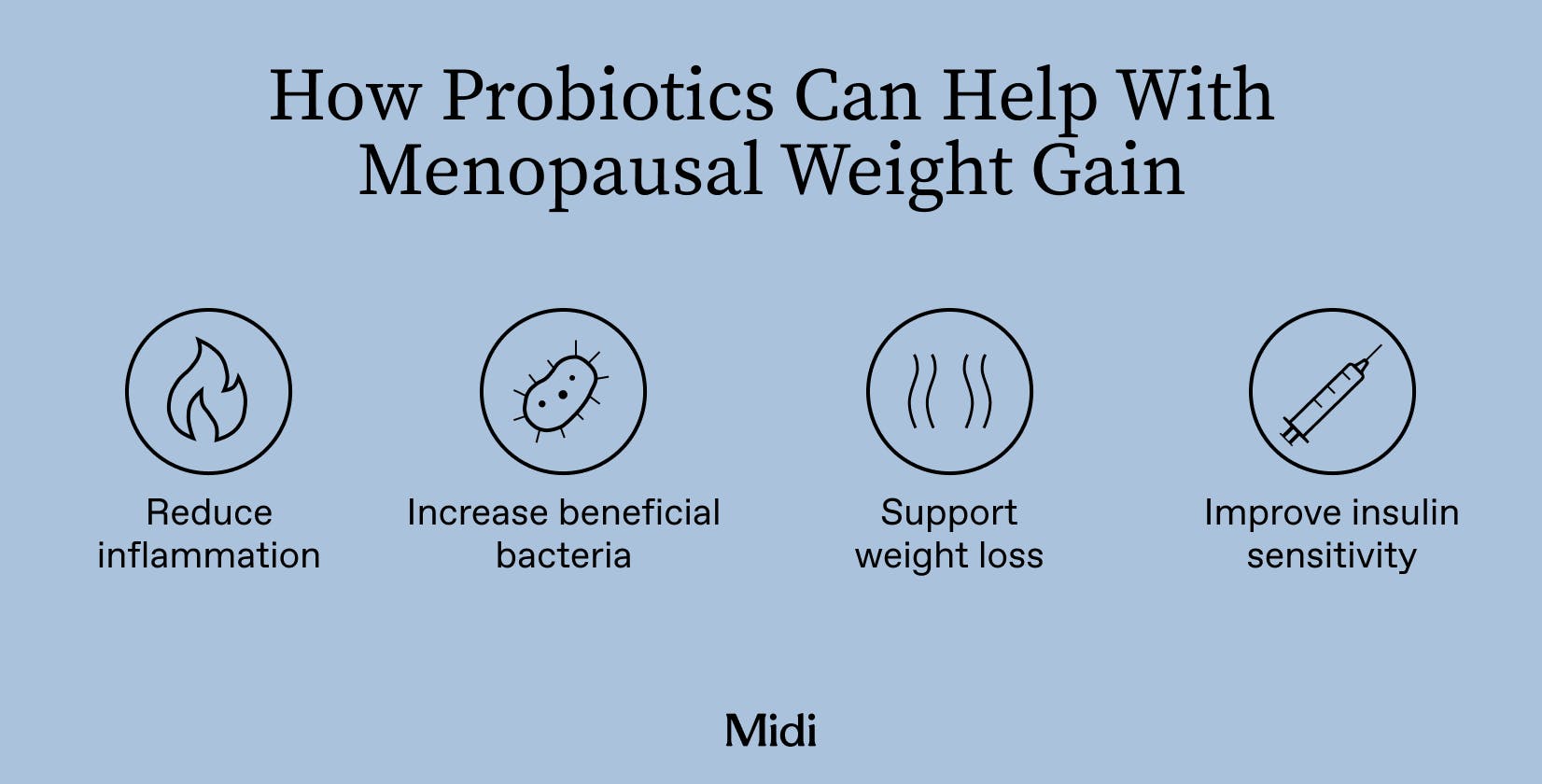If you're wondering whether probiotics can actually help with menopause symptoms—particularly that stubborn belly fat that seemingly appeared overnight—you've come to the right place. And here's what you really need to know: Your gut is just as thrown off by declining estrogen as the rest of your body, and probiotics might be one piece of the puzzle in managing this whole messy, wonderful transition.
Picture this: You're lying awake at 3 a.m. (because of course you are), wondering why your favorite jeans suddenly "shrunk" in the wash, and you start scrolling through articles about gut health. Sound familiar?
Here's the thing—your gut didn't get left out of the menopause party. When estrogen and progesterone start their dramatic farewell tour, your digestive system gets a front-row seat to the chaos. The same hormonal roller coaster that's giving you night sweats and making you cry over dog videos on Instagram is also messing with your gut bacteria.
Your microbiome—that bustling community of trillions of tiny organisms living in your digestive tract—has been quietly helping metabolize estrogen all these years. Think of those good gut bugs as your body's little hormone-recycling crew. But when estrogen levels start doing their perimenopausal dance, this whole system gets a bit...confused. And that's another side effect you don't need. We're here to provide some much needed clarity on what's going on, and, more importantly, what you can do about it.
The Gut-Menopause Connection
Thanks to declining progesterone and estrogen, you might find yourself dealing with:
- bloating that makes you look 6 months pregnant by dinnertime
- constipation that has you googling "natural laxatives" at midnight
- random bouts of diarrhea
- general abdominal weirdness that makes you wonder if you've developed some mysterious food intolerance
Thankfully, relief can come in many forms.
You can pursue hormone replacement therapy (HRT) with a knowledgeable healthcare professional, like a Midi Health clinician, which can help lessen many of the effects of the shifting hormones that decline as you reach the end of your reproductive years.
You can take supplements that can help with everything from sleep to weight gain. You can also add in probiotics, which are live microorganisms that can help boost your body’s good bacteria and support your immune system, gut health, and hormone metabolism. When it comes to menopause symptoms, probiotics have been shown to provide some menopause symptom relief by aiding in digestion, supporting vaginal health, and reducing inflammation.
Research shows that short-term probiotic supplementation might support small improvements in body weight and body mass index (BMI). But we’re going to keep it real with you—we're talking modest here, not miraculous. Think of probiotics as one player on your wellness team, not the MVP who's going to single-handedly win the game.
Read on to learn about how probiotics can play a role in your menopause-symptom strategy, and figure out if they’re right for you.
How does menopause affect your digestive system?
In general, constipation or diarrhea, bloating, or abdominal pain can accompany your period or even be a symptom of pregnancy. Well, they’re pesky symptoms of perimenopause and menopause, too. And it’s all for the same reason (you guessed it!): decreases in progesterone and estrogen. Specific strains of probiotics may help keep your digestive track balanced and offset some of these symptoms.
Gut Health and Probiotics: Can Probiotics Help with Menopause Weight Gain?
You would think you’d have time to prepare yourself for the onslaught of hormonal changes that lead to digestive issues, mood shifts, weight gain, and bone loss—after all, perimenopause symptoms can last up to 10 years—but sometimes it feels like your jeans fit one day, and the next, ugh, meno belly strikes.
If you’ve noticed a little (or a lot of) extra weight around your middle that showed up in your 40s or 50s, you’re not alone. The gradual decline in estrogen production and ovarian function can contribute to a decrease in lean body mass and a shift in fat distribution, with more fat gathering in your middle.

As if the physical reality wasn’t enough, this phase of life is also busy and stressful. Eating healthy and exercising can sometimes fall on the chopping block of your to-do list, despite your best intentions (no judgment here!).
If you're looking for complementary strategies to help you figure out how to lose weight during menopause, this is where probiotics may come in as one tool in your toolkit. Some probiotic strains are believed to support gut health in a number of ways, including:
- reducing inflammation, which could lower the risk of obesity and other chronic health conditions
- aiding weight loss by boosting short-chain fatty acids
- increasing beneficial bacteria
One group of studies even found that short-term probiotic supplementation could support a lower body weight and BMI, though the effects may be small.
Vaginal Health and Probiotics
Speaking of uninvited changes, let's address what's happening down there (because somebody has to, and it might as well be us). Before menopause, estrogen was basically the bouncer at your vagina's exclusive club, keeping the good bacteria happy and the troublemakers out.
But as estrogen clocks out for the day (permanently), your vaginal pH starts shifting from nicely acidic to more alkaline. Translation: Your vagina becomes a more hospitable environment for the bacteria you don't want hanging around, leading to increased risk of:
- urinary tract infections (UTIs)
- bacterial vaginosis (BV)
- yeast infections
- general vaginal unhappiness that no one really talks about at book club
Here's where probiotics actually shine. Research shows that specific strains—particularly Lactobacillus rhamnosus and L. reuteri—can help restore some balance to your vaginal microbiome. Studies have found that taking oral probiotics alongside antibiotics is more effective for treating BV than antibiotics alone.
What Are The Best Probiotics to Take For Menopause?
Choosing the best probiotics for women is like online dating—you need to find the right match for what you're looking for, or you'll end up disappointed and wondering where your money went.
For digestive drama:
- Look for combination formulas with Lactobacillus and Bifidobacterium strains.
- If you have irritable bowel syndrome (IBS) symptoms, Bifidobacterium infantis and Lactiplantibacillus plantarum are your friends.
- Aim for at least 10 to 20 billion CFUs (that's colony-forming units, aka the number of live bacteria).
For vaginal health:
- Lactobacillus rhamnosus, Lactobacillus reuteri, and Lactobacillus acidophilus are the stars of this show.
- You might need higher potency here—50 to 100 billion CFUs can be more effective for vaginal concerns.
For general "I just want to feel better" support:
- You can try multistrain formulas with various Lactobacillus and Bifidobacterium species.
- For maintenance, at least 10 to 20 billion CFUs should do the trick.
Probiotics are measured in CFUs, which measures the number of viable bacteria or yeast cells in a probiotic product. You can typically rely on a higher CFU count to be more potent, and studies have shown that some CFU ranges are beneficial for certain conditions. A lower CFU count may benefit gut health and your immune system, but higher counts (50 to 100 billion) are better for vaginal conditions.
HRT and Probiotics
We don’t need to tell you that it can be a journey to figure out the right type of HRT for you, whether that’s patches, creams, pills, or any other method. And once you’re feeling like your symptoms are under control, the last thing you want to do is rock the boat with….anything.
Because your gut health and vaginal health can be so affected by the hormonal shifts that accompany menopause, a probiotic might just be another part of your menopause arsenal. And research, to date, doesn’t show that probiotics interfere with the efficacy of HRT.
As your healthcare provider, like a Midi clinician, if adding probiotics to your Care Plan can help further alleviate symptoms and get you back to feeling like you again.
Probiotics and Your Diet
While you might choose to buy probiotics in powder or pill form, you can also get them from fermented foods. One Stanford study found that a diet rich in fermented foods enhances the diversity of gut microbes and decreases molecular signs of inflammation. What constitutes a diet “rich” in fermented foods? Participants ate about 6 servings per day of things like:
- Yogurt: Depending on the type of yogurt you reach for, it can have anywhere from 90 billion to 150 billion CFUs. Greek or Icelandic yogurt typically has more than your average flavored yogurt. Studies have also shown that eating your yogurt with honey can increase the probiotic effects.
- Sauerkraut and kimchi: Salting vegetables like cabbage and allowing them to ferment can create these tasty condiments, which you can add to salads or sandwiches, or even eat them on their own with your lunch. As a bonus? Studies have shown that eating small amounts of kimchi three times per day can also decrease BMI.
- Miso: Fermented soybean paste, a staple of Japanese cooking, can be used in soups or added to marinades for meat.
- Kombucha: This fermented tea drink is readily found bottled in stores for an easy dose of probiotics. Drinking up to 16 ounces per day can have probiotic benefits, with fewer side effects like bloating, according to research.
What To Look For in a Probiotic
In a perfect world, our diets would be filled with all the nutrients and microorganisms that our bodies need to function at their highest level. But this life stage certainly isn’t perfect—and we’ve all been known to swing by a drive-through or survive on coffee on particularly busy days—which means supplementing with a probiotic might work better for your lifestyle than simply focusing on probiotic-rich foods.
If that’s the case, a few guidelines can help you pick the right probiotic for you.
- Look for multistrain probiotics with at least 10 billion CFUs.
- Choose clinically tested products with third-party verification.
Doctor-Recommended Probiotics for Women
At Midi, each woman’s Care Plan is tailored to her specific health goal or needs. When it comes to probiotics, we often recommend:
- Pendulum: GLP-1 Probiotic
- Thorne: FloraMend Prime Probiotic
- Seed: DS-01 Daily Synbiotic
- Metagenics: UltraFlora Spectrum Probiotic
Key Takeaways
- The hormonal changes of menopause can affect your gut and your body’s ability to efficiently use estrogen
- Getting plenty of probiotics in your diet, either in the form of fermented foods or a probiotic supplement, can help balance your gut microbiome.
- This, in turn, can support your bones, vaginal health, gut health, and immune system; reduce inflammation; and even make it easier to lose belly fat.
Frequently Asked Questions (FAQs)
What probiotic is best for menopause?
Depending on your menopause symptoms, different strains of probiotics can help support. Look for a probiotic with a high CFU specifically formulated for women or menopause.
How to heal your gut during menopause?
Focusing on a diet full of fiber and probiotics can support good gut health during menopause.
What's the best thing for menopause?
A healthy lifestyle, combined with hormone replacement therapy, if it’s safe for you, is the best way to manage menopause symptoms.
If you’re in perimenopause or menopause and want guidance from clinicians who specialize in women’s midlife health, book a virtual visit with Midi today.
Hormonal change is at the root of dozens of symptoms women experience in the years before and after their period stops.
Our trained menopause specialists can help you connect the dots to guide you towards safe, effective solutions.
Whether you need personalized guidance or a prescription routine to tackle symptoms—including brain fog, hot flashes, sleep trouble, mood swings, and weight gain—we’ve got you covered. Learn more here.
Midi’s mission is to revolutionize healthcare for women at midlife, wherever they live and whatever their health story. We believe that starts with education, to help all of us understand our always-changing bodies and health needs. Our core values guide everything we do, including standards that ensure the quality and trustworthiness of our content and editorial processes. We’re committed to providing information that is up-to-date, accurate, and relies on evidence-based research and peer-reviewed journals. For more details on our editorial process, see here.







